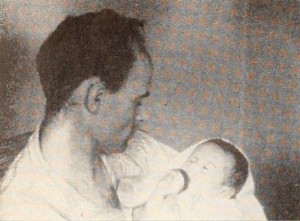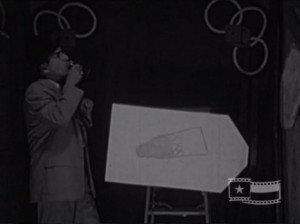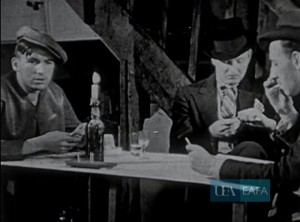
"Here, in Duck Soup, is the true life blood of amateur movie making — the family film. Since the hobby's very beginning in 1923, and consistently through the years since that time, more persons have bought more amateur movie cameras to take family films than for all other reasons put together. And yet look at the results! Or better still, don't look at them — for they are on the average an incoherent hodgepodge of over and underexposure, unsteady camera handling and wild panning on disconnected mementos of familiar milestones. Duck Soup, for those filmers who are lucky enough to see it, should change all that. For here is a well planned and crisply executed family film which has a beginning, a middle and an end. It has also precise camera work, fluid sequencing, and lighting on the children which will delight the heart of all home filmers. Do not, however, let these disciplined excellencies mislead you. For, above all else, Duck Soup is no stodgy exercise in family record keeping. These people had fun! Look . . . Duck Soup is a rollicking, rambunctious saga of what happens in a household when Pop, charging recklessly that the trials of homekeeping are "duck soup," is deserted for a few days by his deserving wife. What happens, as Pop gets the works from a quintet of utterly engaging youngsters, shouldn't happen (as they say) to a dog. There is stolid, well-meaning Tim, who, returning from the corner store, mangles a loaf of bread beyond all human use; there is demure and lovely Ellen, who plays the bride with Mom's best lace tablecloth; there are Greg and Kevin, impish and angelic twins, who roughhouse their way through the afternoon nap, bathing, haircuts and countless other high-spirited adventures. And there is, finally, Gary, the baby, who bawls like a foghorn and is Pop's particular problem-of-the-day. Duck Soup, in recounting these hilarious misadventures, is not a "great" film in the majestic sense of the word. (Majesty would be impossible in the face of that Lawler brood!) But it is family filming of the finest sort. It is warm, winning and alive with good spirits. Duck Soup is the best of the Ten Best for 1952 — and it richly deserves the Maxim Memorial Award which it has won." Movie Makers, 1952, 323-324.

"This amateur film produced by longtime Austin residents Ramon and Pauline Galindo, features Ramon performing illusions with alcohol. As Ramon proceeds to get drunk, the illusions become more compelling" Texas Archive of the Moving Image.
The Drunk Act was produced at some time in the 1950s.
"It all began when the faucet started to drip." Oldfilm.org

"A tale of greed, murder and passion set in a French provincial town in the 1930s. The focus is a tawdry basement drinking and gambling club. Rejecting the violent advances of a man who returns to her rooms with her, a local girl kills him and is assisted in the disposal of the corpse by her regular beau - a cynical, louche cardsharp. A vigilant detective brings her to court for murder. Witnesses take the chance to blacken her name by giving false testimonies but she is acquitted. Her freedom is soured by her lover's rejection of her and she returns to the streets" East Anglian Film Archive.
"The film is credited to Evelyn, who captures her husband’s collecting habits of “everything and anything.” This time it happens to be driftwood. Title cards of dialogue are interspersed with images of John and Evelyn collecting driftwood along a Wisconsin beach." Chicago Film Archives
"Drifting, a two reel photoplay produced under the direction of Jack Navin, ACL, is an old school melodrama, planned, played and directed to ring the last harsh change on the "wages of sin" motif. It is distinguished by consistently dramatic lighting, a smoothly sequenced filming plan and a definitely mature understanding of cinematic treatment. In it a large cast plays well and with a thorough seriousness that adds much charm to the original melodramatic conception." Movie Makers, Dec. 1932, 561.
"Another melodrama, delightful in its serious characterizations and adroit in its cutting and camera treatment, has been completed under the direction of Jack Navin, ACL, producer of Sophistication and Those Mad Barclays. The new work is Drifting, a direct descendant in the Navin tradition, as it tells a tale of the relentless downfall of too, too pretty Ellen Rowen in vain search of her kidnapped little brother. Once the toast of Paris, in the end a drab of Montreal slums, Ellen drifts inevitably to a harsh fate, protesting bitterly on her pathway that she "was once a lady." Elizabeth Sutherland played Ellen with " a defensive delicacy that was touching. Other parts were ably carried by Virginia Simmons, Margaret Newnan, Gretchen Rickel, Mary Reynolds, Nellie Navin, Martha Blodgett, Coman Munroe, Junie Newnan, Ted Newnan, Bobby Sutherland, Fred Griffiths, Bill Laurie, Thayer Hutchinson, Bob Drysdale, John Hutchinson, Edward Mackenzie, Bill Newnan, the Blodgetts and Mr. Navin."
Movie Makers, Dec. 1932, 575, 577.
"Children get dressed after swimming with help from their mother; later they are seen larking around in the garden, tying their father up with a rope." (NWFA Online Database)
"The special award, also of $500, went to Kennin Hamilton, of 28 Maitland Street, Toronto, Ontario, Canada, for his visualization of Hood's 'The Dream of Eugene Aram' in 16 millimeters. Mr. Hamilton played the principal role of Eugene Aram, disclosing a graceful pantomimic skill. The photography was handled by K. A. Mackenzie. A Cine Kodak, using Kodak Safety Film, was used. Mr. Hamilton had no special lenses or equipment and yet he achieved some singularly beautiful shots. Nature supplied his lighting, even for his interiors. A stepplader served as a tripod." Photoplay, Jun. 1928, 136.
"Artist Dewey Albinson tours an old farm and helps viewers see it in terms of the unusual shapes, interesting colors and rough textures that make strong compositions." Minnesota Historical Society.
"Clyde Hammond, of 65 Murdock Street, Youngstown, Ohio, won an honorable mention in the 16 millimeter division for his study of country life, 'The Dragon Fly.'Mr. Hammond worked out a strong atmospheric study of a selfish country boy, home from college, and his hard-working farmer father."Photoplay, Jun. 1928, 137
Total Pages: 299